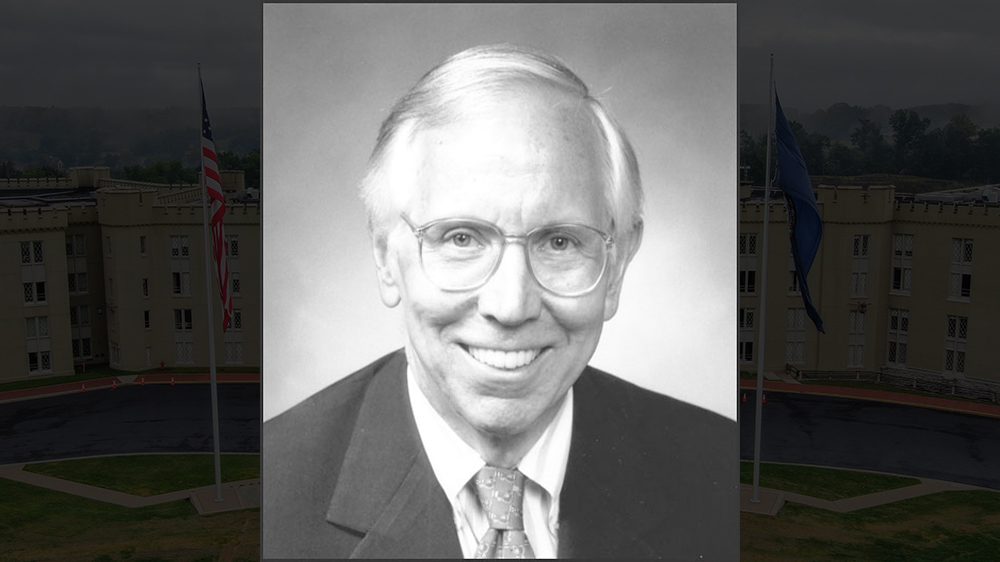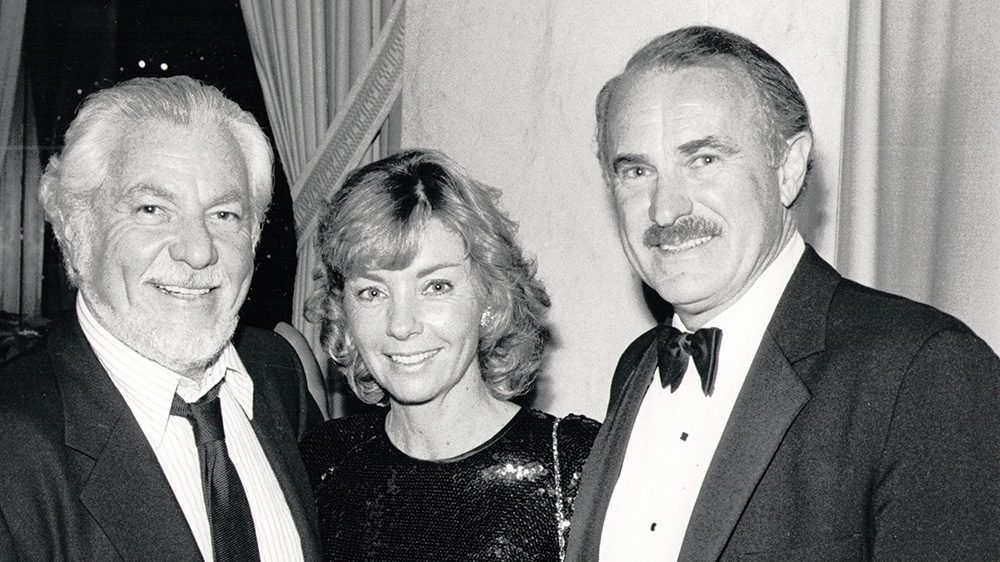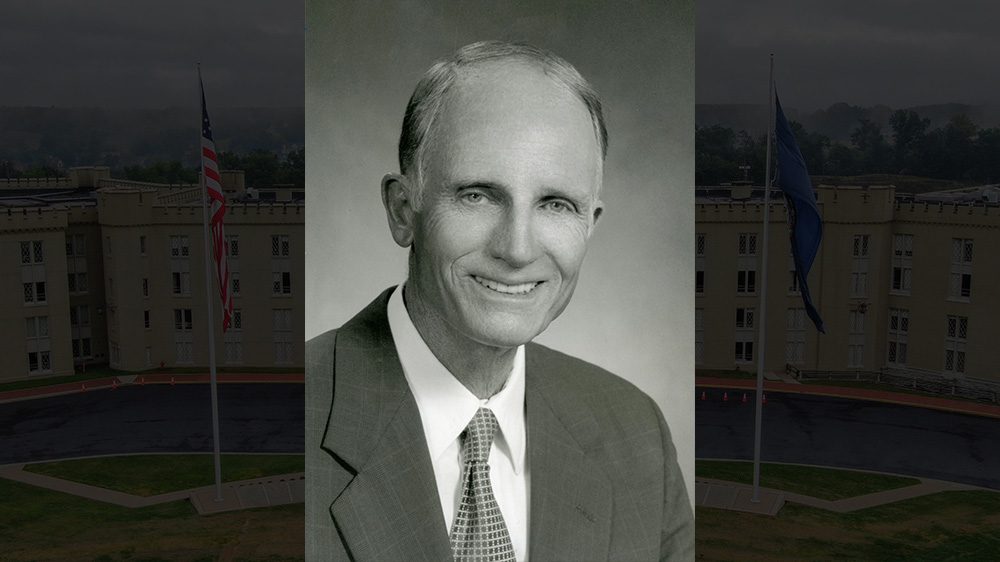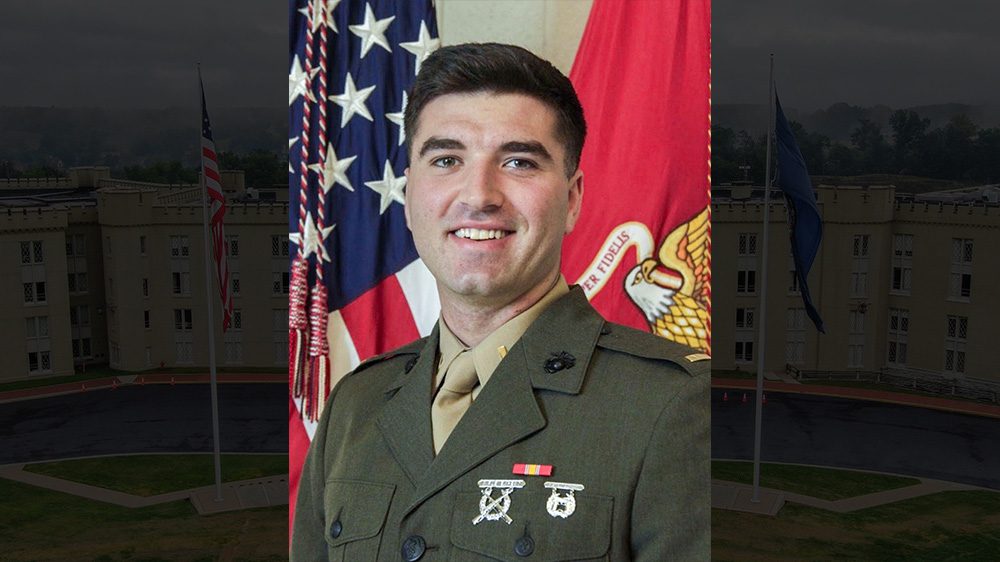Samuel B. Witt III ’58, who served on the VMI Board of Visitors for 11 years and was BOV president from 2001–05, died July 6, 2023. He was 87.
Witt’s father was Samuel B. Witt Jr., Class of 1918, and five cousins and two uncles were also alumni. An English major, Witt was on the staff of the Bomb and The Cadet, serving as the newspaper’s editor-in-chief and managing editor during his 1st Class year. He was a member of the Glee Club, the VMI Commanders, and the Timmins Music Society. Witt was a cadet corporal, a cadet first sergeant, and a cadet captain who commanded Company D. A Distinguished Graduate and Distinguished Air Force Graduate, he was named to Who’s Who Among Students in American Colleges and Universities.
After graduation, Witt served in the U.S. Air Force for three years. He was stationed in Germany with the 585th Communications and Guidance Squadron.
Witt entered the University of Virginia School of Law in 1961. There, he continued his record of academic excellence and won the William Minor Lile Moot Court competition. His performance earned him a place in the prestigious honor society for law school graduates, the Order of the Coif, and the Raven Society, a student honor society at UVA. He then joined the Richmond firm of Christian, Barton, Epps, Brent, and Chappell.
In 1966, he decided, as he said, “to seek my fortune as an international lawyer.” From 1966–70, he was the assistant general counsel for C/I/Girdler International, S.A., an affiliate of Bechtel Engineering. Witt joined General Mills Europe in 1970 as European counsel and director of finance. He graduated from the Harvard Business School’s Senior International Managers Program in 1976.
Witt joined R.J. Reynolds Industries in Winston-Salem, North Carolina in 1977. There, he held several positions, including the vice president, general counsel, and secretary of R.J. Reynolds Tobacco Company from 1981–86. RJR Nabisco’s board selected him as the corporation’s vice president, special counsel in 1986. Three years later, he became a partner in North Carolina’s largest law firm, Womble, Carlyle, Sandridge & Rice.
In 1988, he co-founded Stateside Associates, a Washington-based government relations firm. He did not, however, work full-time at Stateside until 1993. As its senior vice president and general counsel, Witt concentrated on state legislative and regulatory issues, especially those related to civil justice reform.
Witt was a member of the American Law Institute, the Defense Research Institute, the Association of Defense Counsel, and the Product Liability Advisory Council. He was a trustee of the University of Virginia Law School Foundation for 12 years. He served on many corporate boards and was a member of the governing boards of Winston-Salem State University and the Western Carolina University School of Business.
Unshakably committed to the Institute, Witt devoted much of his time and talent to its service. He was a trustee of the VMI Foundation from 1988–94 and, immediately afterward, was selected to join the BOV. During the next 11 years, he was a member of several committees, such as the Academic Affairs Committee and the Cadet Affairs Committee. He led several committees, including the Committee on Appeals, which reviews disciplinary and Honor Court matters, and the External Development Committee. Witt became the board’s vice president in 1996, and in 2001, he became the BOV president, a post he held for four years.
Mike Strickler ’71 became the special assistant to the superintendent and the BOV secretary the same year Witt became the board’s president. “He was magnificent,” said Strickler. “He knew how to get things done. He was demanding and paid incredible attention to detail.” Strickler recalls the first set of minutes—about 20-25 pages long—he submitted to Witt. “He was an English major, and when he returned the minutes, they were marked up in a way that would have made his English professors proud. I can assure you I got better at those minutes, and the amount of red ink on them steadily declined. That was what he did: He made everyone better.
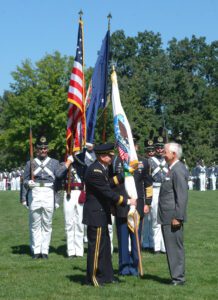
Samuel B. Witt III ’58 takes part in the parade marking the inauguration of Gen. J.H. Binford Peay III ’62 as the Institute’s 14th superintendent in 2003. Witt served as president of the VMI Board of Visitors from 2001–05 and played a leading role in recruiting Peay to VMI.—Photo courtesy VMI Communications & Marketing.
“Sam was demanding, but he never made demands. He persuaded people instead, smoothly leading people in what he thought was the best direction,” Strickler continued. “Everyone appreciated him for that. He treated people very kindly and was something of a father figure.”
Strickler pointed out the important role Witt played in “the huge transitional period” between the administrations of Lt. Gen. Josiah Bunting III ’63 and Gen. J.H. Binford Peay III ’62. “He was the driving force in getting General Peay to accept the job as superintendent, and he worked so well with General Peay in those first couple of years. He was great for the board and great for the Institute.”
Peay credits Witt with being a major influence in his decision to become superintendent. “He was very persistent in strongly encouraging me and my family to come back to VMI. It turned out to be one of my very best decisions, and I will always be indebted to him for that.”
S. Waite Rawls III ’70 served on the BOV with Witt for nine years. A veteran of many boards, corporate and otherwise, Rawls described Witt as “the best board leader I have ever seen.” According to Rawls, Witt’s strengths were simple. “He insisted the board act like a board and committees act like committees. That’s basic stuff, but many board leaders don’t pay attention to it.” Rawls was a committee chairman and recalls Witt expected “succinct and timely reports. Also, about a week after a board meeting, he’d call and ask me for an agenda for the next meeting and what I needed from the Institute staff to support it.”
“Sam was never afraid to tackle tough issues, and he always was thinking ahead and constantly coming up with ideas to improve VMI. When Brig. Gen. Robert L. Green ’67 served as acting superintendent in 2003, Sam once called him and, as he often did, began by saying, ‘I’ve got a great idea.’ Bob, who was still dealing with Sam’s previous ideas, replied, ‘Sam, would you mind if we have a moratorium on new great ideas?’”
Peay said of Witt, “Sam represented the true spirit of VMI. He was always supportive of all things VMI for many, many years.” Besides being a trustee of the VMI Foundation, he was on the Jackson-Hope Fund’s Board of Overseers from 2002–16 and the governing committee of the fundraising campaign, Reveille: A Call to Excel. His leadership helped ensure the success of the Class of 1958’s 50th Reunion Fund: 90% participation and a record-setting $16.1 million raised.
In 1998, Witt joined the board of the College Orientation Workshop. Founded in 1987 by Gene Williams ’74, the organization prepares male minority high school students to achieve success in high school and beyond through an intense four-week educational enrichment program during the summers at VMI.
“When Sam committed to doing something,” recalled Williams, “it was as good as done, and he demonstrated that commitment in both word and deed. He helped guide COW to significant growth in terms of program offerings, geographic scope, and financial stability.”
When Witt joined COW’s board, it had about $66,000 in equity. Witt soon arranged a meeting between his brother rat, Thomas A Saunders III ’58, and Williams. “Sam introduced me to Mr. Saunders, and I gave my ‘elevator presentation.’ As a result, COW received a significant pledge from Mr. Saunders. That pledge … and many other commitments have helped COW’s equity to grow by almost 30-fold.” Furthermore, according to Williams, “Sam held COW’s leadership to high standards—and mentored me personally—in the challenging world of charity management. I am so glad he chose to share his gifts and his time with COW. I count that as a true blessing.”
The fruitful association between Witt and Neville Anderson ’84 began in 1989 when, after an introduction by Harry Warner ’57, Witt joined Anderson’s Nevander Asset Management, Inc., board. During the decade Witt was on the board—and afterward—Anderson “counted on [Witt] as a mentor.”
“Sam’s advice was always gentle and thoughtful,” Anderson said. “He never said, ‘You’re crazy,’ when I presented an idea. Instead, he’d say, ‘How can I help?’” That help, according to Anderson, included access to people Witt knew. “His Rolodex was my Rolodex.
“I was aware of his professional reputation and experience. So, when he spoke, like everyone else, I listened.” However, Anderson saw a side of Witt that few might have. “He was a warm, very caring man who would stop by for drinks when I lived in southern California.” During their decades-long relationship, Anderson and Witt had many conversations on many topics. “Sam was incredibly perceptive and forward-thinking. He spotted trends in business, media, and society remarkably well, and, while highly principled, he was pragmatic, always seeking to find common ground to advance the common good.” It was his personal relationship with Witt that Anderson treasures. “He treated me almost like a son, and I loved him for that. He was a great man.”
Witt is survived by his wife of 56 years, Sally; two sons, Clay and Sam, and their wives; three grandchildren; and two brothers.
-

Scott Belliveau '83 Communications Officer - Executive Projects
The communications officer supports the strategy for all communications, including web content, public relations messages and collateral pieces in order to articulate and promote the mission of the VMI Alumni Agencies and promote philanthropy among varied constituencies.

